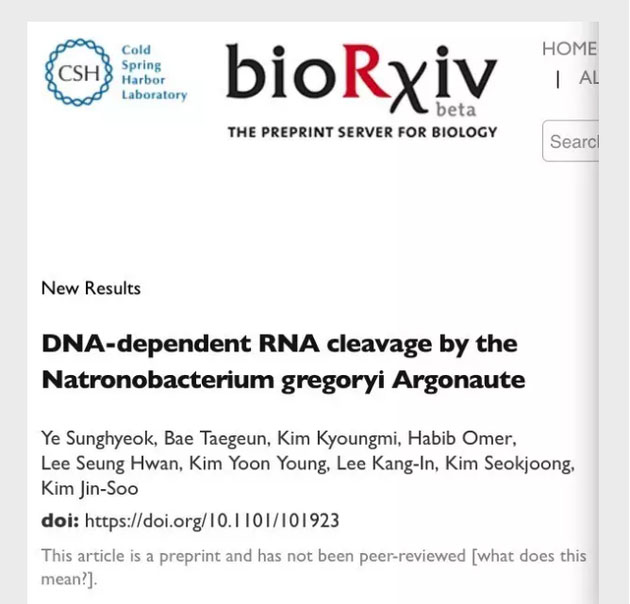After many scientists said that they could not repeat the work of Han Chunyu's NgAgo shear-modifying DNA, Korean scientists who have reported that they can't do the same have made new progress in further research on NgAgo. They published a paper in the form of a preprint on January 20, claiming that NgAgo can act on RNA. What is the significance of this result? Other scientists who questioned the role of DNA editing also saw the role of NgAgo in reducing gene expression, but at the time it was only found that it was not acting and DNA, and it was not known whether RNA or protein was acting. Korean scientists have obtained RNA as a target for NgAgo. In addition, other scientists are looking for other homologous proteins of the Ago family that act on DNA. Han Chunyu’s research has actually stimulated new research. How is his research judged? What does Novozymes' unwilling cooperation mean? What new materials are received by Nature-Biotechnology and how are they determined? The event is still to be further developed.
Can DNA-mediated NgAgo achieve genome editing? Since Han Chunyu, an associate professor at Hebei University of Science and Technology, and his collaborators in May last year, Nature Biotechnology has reported that the NgAgo-gDNA system may be a gene editing tool with great potential, the scientific community has been able to carry out NgAgo. The discussion of genome editing has not stopped.
On January 20th, Korean scholars reported another study on NgAgo. The DNA-dependent RNA cleavage by the Natronobacterium gregoryi Argonaute, published in the paper's pre-printed website BioRxiv, says that DNA-mediated NgAgo proteins cleave RNA, not DNA.

South Korean scholar Jin-Soo Kim and others in BioRxiv said that DNA-mediated NgAgo protein cleaves RNA, not DNA.
Is NgAgo protein cleavage RNA, not DNA?
The article shows that the Jin-Soo Kim team at Seoul National University in South Korea found that NgAgo has DNA-dependent RNase activity through in vitro biochemical experiments, and they also found that the DNA (gODNs) sequences that bind to NgAgo must be reverse-compatible with RNA. The sense DNA sequence does not direct NgAgo to cleave target RNA. That is, the DNA sequence that binds to NgAgo cannot direct NgAgo to cleave the target RNA if it is identical to the RNA sequence.
In contrast, Jin-Soo Kim et al. did not find NgAgo cleavage DNA activity in this in vitro biochemical system. This result is different from the conclusion that NgAgo, previously published by Han Chunyu in Nature-Biotechnology, has DNase activity.
On August 8, last year, Han Chunyu mentioned in the detailed experimental method submitted to the plasmid sharing information library Addgene that EDTA (divalent cationic chelating agent) may affect the activity of NgAgo. In this paper, Kim et al. provide in vitro biochemical evidence, but demonstrate that divalent metal ions are essential for NgAgo RNase activity (rather than DNase activity).
The authors also conducted further experiments to determine the effect of the length and sequence of gODNs on the efficiency of NgAgo cleavage of RNA. Experiments have shown that the length of gODNs below 13 nucleotides (nt) can not mediate the RNase activity of NgAgo, and the base mismatch will affect the enzyme activity of NgAgo, especially 5-14nt (5'-3' The base of the direction is the most critical. These results are similar to the DNase activity of Cas9, but interestingly, the authors found that NgAgo can be catalyzed multiple times, while Cas9 can only be used once.
China Extract Powder For Use As Dietary Supplement Extract Powder, Extract Powder Manufacturer
Shaanxi Kang New Pharmaceutical co., Ltd. , https://www.kangnewpharmas.com